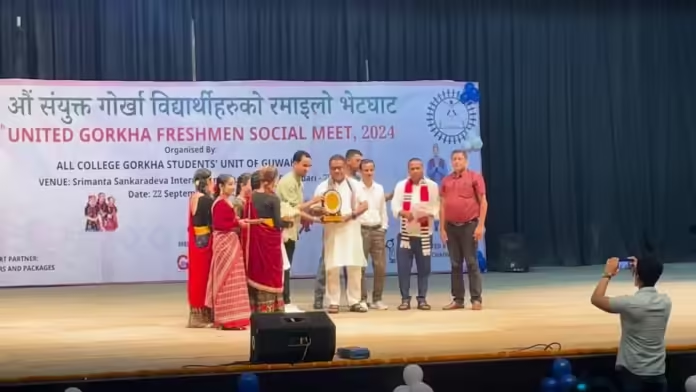Assam Education Minister Ranoj Pegu recently emphasized the importance of Gorkha students preserving their cultural identity while pursuing success in their academic and professional careers. In an exclusive conversation with India Today NE, Pegu spoke about the diverse student population in Guwahati, where many students from different parts of Assam come to study. As students from various communities flock to the city in search of better educational opportunities, Pegu highlighted the unique challenges and opportunities they face. For Gorkha students, maintaining their cultural roots amid the drive for academic and career success is crucial, according to the minister.
Pegu acknowledged that Guwahati is rapidly becoming a hub for higher education, attracting students from rural areas and smaller towns across Assam. The city provides a variety of opportunities for students to excel academically and professionally. However, he pointed out that in this process, there is often a risk of cultural assimilation, where students may lose touch with their heritage. He believes that education should not only focus on academic excellence but also on preserving one’s cultural identity. “It is important for students, especially from minority communities like the Gorkhas, to hold on to their cultural values while they work toward success,” he stated.
The Gorkha community in Assam has a rich cultural history, and Pegu stressed the need for its youth to stay connected to their roots. He acknowledged the challenges of balancing cultural preservation with academic demands, but he encouraged students to embrace both aspects. “Students can find a way to excel in their studies while still celebrating their traditions, language, and heritage. It’s all about finding the right balance,” Pegu explained. He urged Gorkha students to take pride in their cultural identity and to pass it down to future generations, even as they strive for success in their chosen fields.
Pegu also discussed the role of educational institutions in helping students stay connected to their culture. He mentioned that schools and colleges should take an active role in promoting cultural diversity and encouraging students from different communities to engage with their heritage. “Our educational institutions must go beyond academics. They should be places where students can express their cultural identity and learn about the richness of Assam’s diversity,” Pegu noted. He emphasized that creating a supportive environment for cultural expression can empower students from all backgrounds to take pride in their heritage while excelling in their studies.
The minister’s comments come at a time when cultural preservation is becoming an increasingly important issue for many minority communities in India. The Gorkhas, who have long been an integral part of Assam’s cultural fabric, face unique challenges in preserving their identity while adapting to modern educational and social environments. Pegu stressed that the government and educational institutions have a responsibility to support these communities, ensuring that their cultural heritage is not lost in the pursuit of academic success.
Pegu also pointed out that preserving one’s culture can be a source of strength and inspiration for students. He believes that students who stay connected to their roots often have a stronger sense of identity and purpose, which can fuel their drive for success. “When students know where they come from and are proud of their heritage, it gives them a sense of purpose. It motivates them to work harder and achieve their goals, not just for themselves but for their community,” he said. The minister encouraged Gorkha students to view their culture as an asset that can enhance their educational journey.
In addition to preserving culture, Pegu spoke about the importance of inclusion and representation in the educational system. He believes that students from all communities should feel seen and valued within the education system. “It’s important that students from minority communities, like the Gorkhas, see themselves represented in the curriculum, in leadership roles, and in the broader educational environment. When students feel included, they are more likely to succeed academically and contribute positively to society,” he explained.
As Assam continues to develop its educational infrastructure, Pegu’s focus on cultural preservation highlights the need for a holistic approach to education. For Gorkha students, balancing cultural heritage with academic success is not just about preserving the past, but also about shaping the future. The minister’s message to students was clear: while academic success is important, it should not come at the cost of one’s cultural identity. “Students should aim high, pursue their dreams, and achieve great things, but they should never forget where they come from,” Pegu concluded.
His words serve as a reminder that education is not just about academic achievement but also about understanding and valuing one’s roots. For Gorkha students, the path to success lies not only in their ability to excel academically but also in their commitment to preserving and celebrating their culture.


